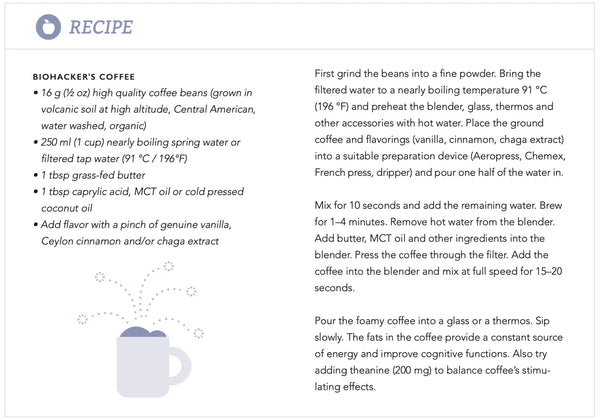Coffee is an important part of a biohacker’s daily routine: many people enjoy coffee daily due to its stimulating and mood-lifting effects. We all know the feeling of preparing freshly brewed coffee beans into a delicious and energizing drink. But what if you could upgrade your beloved coffee and get the most out of its health benefits? When coffee recipes are intelligently orchestrated you can enjoy the benefits of coffee while balancing the stimulating effects, thus enjoying a longer-lasting boost of energy and focus. In this article, we prepared information about choosing and preparing high-quality coffee, and its health benefits for you to learn more about this globally beloved beverage.
Did you know that Finns drink the most coffee in the world, on average 12 kg (26 pounds) per capita? In the US, a person consumes on average a little over 4 kg (9 pounds) of coffee in a year. Due to its popularity, large quantities of various pesticides are used to maximize coffee production. Therefore, it is worthwhile to invest in high-quality coffee and a proper preparation method, if only for a more satisfying coffee experience. High-quality coffee has a well-rounded flavor in that its aromas need not be covered up with sugar, milk, or cream.
Coffee that has been grown and processed with quality in mind contains fewer harmful substances and more of coffee’s beneficial active agents. In terms of ethics, it is a significantly more sustainable choice compared to intensively produced coffee. Therefore, we recommend avoiding instant coffee, blends of several coffee bean varieties, and coffee that is grown near sea level (at low altitudes). Instead, favor high-quality organic or pesticide-free, pure coffee. Choose single-origin and water-washed coffee that has been grown at high altitudes.
For most people, reasonable coffee consumption (3–4 cups per day) is compatible with a healthy, balanced diet and an active lifestyle. According to a comprehensive meta-analysis, reasonable coffee consumption may lower the risk of developing type 2 diabetes, cardiovascular diseases, and extend the life span. The health benefits of coffee are most likely due to the antioxidants it contains, such as polyphenols. Indeed, more than 1,000 antioxidant compounds have been found in coffee, even more than in green tea and cocoa.
PREPARE HIGH-QUALITY COFFEE
- Grind the coffee beans yourself immediately before use
- Use a metal filter, avoid paper filters processed with chemicals
- Only purchase coffee for a maximum of two weeks’ consumption at a time
- Always store coffee in an airtight container
- Use kitchen scales to measure the ratio of coffee to water
- Don´t over brew coffee
- Do not add sugar, milk, or cream to coffee
- Time coffee consumption at a sensible part of your day
Choose high-quality pure coffee. Grind the beans into a fine powder. Heat filtered water to a nearly boiling temperature 91 °C (196 °F) and preheat the blender, glass, thermos, and other accessories with hot water. Place the ground coffee and flavorings of choice (vanilla and/or chaga extract) into a suitable preparation device (e.g., Aeropress, Chemex, French press, or dripper) and pour one half of the water in. Mix for 10 seconds and add the remaining water. Enjoy!

TEST HOW COFFEE SUITS YOU
The effects of coffee depend on your genetic makeup. For example, caffeine, mycotoxin, and paracetamol (among others) are broken down in the liver mainly by the CYP1A2 enzyme. Hence, the CYP1A2 gene affects the ability to remove caffeine from the system. Each individual has genetic variations in their CYP1A2 enzyme system,and therefore, the same amount of caffeine may have a different effect on different people. Individuals with variant 164A>C in the CYP1A2 gene have a slow enzyme system. For these individuals, drinking coffee can increase the risk of heart attack and/or high blood pressure. It is recommended to test how coffee suits you, for example, with the AthGene premium Genetic test. This allows you to optimize your coffee consumption (and other aspects of health) accordingly.
How do you enjoy your coffee? Tell us in the comments!





